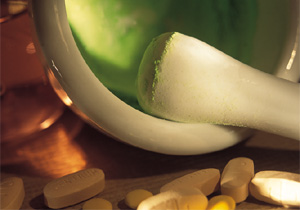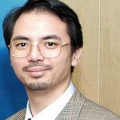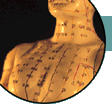|
 |
Introduction to TCM

Basics of TCM

• Yin-Yang | Five Elements

Zang-Fu Theories

• Zang Organs | Fu Organs

Classification of Antineoplastic Herbal Medicines

Characteristics of Herbal Medicines

Diagnose

• By Auscultation & Olfaction
• By Inspection

Prescriptions

Theories of Channels (Meridians) and Collaterals

Reference: A Modern View of the Immune System

Differentiation of Syndromes

• 8 Principles
• 6 Channels 4 Stages
• Syndromes of Zang-Fu Organs

Etiology

• Exogenous
| Pestilential
• Pathogenic Factors
• Emotional

Materia Medica


Back to Home

|
 |

Heart
From the TCM perspective, the main physiological functions and
indicators of the heart includes (1) the domination of blood and vessels,
and facial complexion, (2) control of the mind; and (3) opening into the tongue.
The heart has an "exterior" (biao) and "interior" (li) relationship
with the small intestine.
Dominating Blood and Vessels, and Facial Complexion
The heart dominates the blood and vessels indicating its
function of promoting blood circulation. In the Suwen,
it says, "... The heart is in charge of the blood vessels ...."
The vessels are the pathways of blood circulation while the
heart is the motive power of blood circulation.
Only if there is ample heart qi can the blood circulate
incessantly in the vessels to nourish the whole body.
The heart, blood, and vessels are interrelated.
Because of the rich distribution of blood vessels in the
facial region, the color and luster of the complexion
usually reflects the sufficiency or insufficiency of the blood
supply and heart qi. If the heart blood supply is
sufficient, then the pulse beats normally and forcefully and
the facial complexion is rosy with luster. If the heart
qi is insufficient, the vessels will be empty, the pulse
feeble and weak or irregular and the facial complexion pale.
Insufficient heart qi may lead to blood stagnation manifested
by a blue complexion. So in the Suwen is says, "The heart
is the root of live, ... its luster is manifested in the face,
it fills up the blood vessels ..."
Controlling the Mind
Mind here indicates spirit, consciousness, and thinking.
Traditional Chinese medicine considers that mind refers to
the five zang organs, especially the heart. So in the Lingshu
it says, "The organ that is responsible for the performance
of activities is the heart." This means the process of thinking
is accomplished by the heart. Blood is the main foundation
for mental activities, thus the function of heart controlling
the mind is closely related to the function of heart
dominating the blood and the vessels. If there is plenty
of heart blood, the mind is clear, thinking is nimble, and
one is full of vim and vigor. If heart blood is
insufficient, it will lead to the pathological changes of
heart-mind manifested by palpitation, insomnia, dream disturbed
sleep, poor memory, restlessness, etc. If heat in the blood
disturbs the heart-mind, there will be delirium, coma, etc.
Opening into the Tongue
One of the branches of the heart channel directly
connects with the tongue. So physiologically the tongue
has a close relationship with the heart. The qi and the
heart blood all flow up to the tongue in order to assist
its normal physiological functions. If there is a
pathological change in the heart, it will be reflected
in the changes of the tongue. For example, an insufficient
supply of heart blood may be manifested by pale tongue
proper; heart fire flaring up is reflected by red
tongue proper, or even by ulcers of the tongue; blood
stagnation in the vessels in presented by a purple tongue
or purpura; pathogenic heat invading the pericardium or
pathogenic phlegm obstructing the heart orifice, will
produce coma, delirium, and stiffness of the tongue.
Thus it is said, "The heart opens to the tongue," or
"The tongue is the sprout of the heart."
Pericardium
The pericardium is called xinbaoluo in Chinese.
Structurally it is a membrane surrounding the heart,
and physiologically it protects the heart. When
exogenous pathogenic factors attack the heart, the
pericardium is affected first. The Lingshu notes,
"Therefore the pathogenic factors that intend to attack
the heart must first attack the pericardium."
Clinically the symptoms of pathogenic invasion of
the pericardium are the same as if the heart was ill.
If pathogenic heat attacks the heart, the symptoms
are unconsciousness, delirium, etc. If pathogenic
phlegm causes mental confusion, unconsciousness or
mental disorder, it is known as "pathogenic phlegm
obstructing the heart orifice."
Related Subjects
Read more on other Zang Organs:
Lung,
Spleen,
Liver, and
Kidney.
|

|
|
|
|
|
 |

|
WHAT IS TRADITIONAL CHINESE MEDICINE?

Photo © Image DJ Image Dictionary
With over 3000 years of experience, Traditional Chinese Medicine (TCM) has
remain one of the many fascinating areas in ancient Chinese culture.
First known to be documented in the Yellow Emperor's Canon of Medicine,
TCM is believed to have been practised in as early as 475 to 221 B.C.
The field of working knowledge of TCM stretches from anything related to
general healthcare practice to the philosophy of the mind, the logic of life,
religion, and even to as far as cosmology and astronumerology. This is why
in order to thoroughly understand the concepts behind TCM, one must be
comprehensive in learning and embracing the Chinese culture as a whole.
Just as Douglas Hoff put it when he explained about accupuncture, "The systems
of TCM uses the concepts of elements and meridians and are completely immersed
in the Asian cosmology which takes shape through the religions." The meridian-brain mechanism,
the fundamental working concept of acupuncture, in which the pain block from the message
that the needle or burning cone of herbs gives to the point of stimulus,
was only found centuries later by the West through science and technology.
|
| |
|
MESSAGE FROM THE EDITOR – MARCH 2020
 Thank you for visiting this TCM and acupuncture information website.
If you have previously been to this website, you might have
noticed that some of the pages on ancient historical ideas and
holistic thinkings related to Chinese metaphysics are temporarily taken offline.
This is because I will be revamping the whole website and be moving
those information into a new \"Ancient Chinese Culture\" section
so as to reflect a more current perspective on the interpretation
of some of the fundamental concepts as well as to include
some of the latest information in the area.
But if you have just found this website for the very first time, I welcome you again and
wish you could find what you require and, hopefully, you could also be benefitted
from reading the articles I published on this website.
Thank you for visiting this TCM and acupuncture information website.
If you have previously been to this website, you might have
noticed that some of the pages on ancient historical ideas and
holistic thinkings related to Chinese metaphysics are temporarily taken offline.
This is because I will be revamping the whole website and be moving
those information into a new \"Ancient Chinese Culture\" section
so as to reflect a more current perspective on the interpretation
of some of the fundamental concepts as well as to include
some of the latest information in the area.
But if you have just found this website for the very first time, I welcome you again and
wish you could find what you require and, hopefully, you could also be benefitted
from reading the articles I published on this website.
Please be patient and do come and check out this website frequently as it's being revamped.
Raymond Cheng, PhD DPA FRSA FRSPH

March 28, 2020.
|

|
IMPORTANT NOTICE AND DISCLAIMER

 This website is published, edited and designed by Raymond Cheng,
and reflects only and only his personal views and opinions in his individual capacity.
The information available at this website is not intended
directly or by implication to either diagnose or treat any
medical, emotional, or psychological condition or disorder.
It is also not intended to create a physician-patient relationship
between you and I or between you and Wyith Institute™ and The Office of Dr Raymond K K Cheng.
The information here is not a substitute for advice and treatment provided
by your physician or by another healthcare professional.
It is always recommended that consultation with local healthcare providers
be obtained for any of your specific health or medical concerns.
Furthermore, any products that can be purchased (yet you can see I don't have much
to sell here) through advertisers' banners or through links to other websites
are not either explicitly or implicitly given any warranty or endorsement
by me, my colleagues, Wyith Institute™ or any of its associated businesses.
This website is published, edited and designed by Raymond Cheng,
and reflects only and only his personal views and opinions in his individual capacity.
The information available at this website is not intended
directly or by implication to either diagnose or treat any
medical, emotional, or psychological condition or disorder.
It is also not intended to create a physician-patient relationship
between you and I or between you and Wyith Institute™ and The Office of Dr Raymond K K Cheng.
The information here is not a substitute for advice and treatment provided
by your physician or by another healthcare professional.
It is always recommended that consultation with local healthcare providers
be obtained for any of your specific health or medical concerns.
Furthermore, any products that can be purchased (yet you can see I don't have much
to sell here) through advertisers' banners or through links to other websites
are not either explicitly or implicitly given any warranty or endorsement
by me, my colleagues, Wyith Institute™ or any of its associated businesses.
|

|
|

 This website is published, edited and designed by Raymond Cheng,
and reflects only and only his personal views and opinions in his individual capacity.
The information available at this website is not intended
directly or by implication to either diagnose or treat any
medical, emotional, or psychological condition or disorder.
It is also not intended to create a physician-patient relationship
between you and I or between you and Wyith Institute™ and The Office of Dr Raymond K K Cheng.
The information here is not a substitute for advice and treatment provided
by your physician or by another healthcare professional.
It is always recommended that consultation with local healthcare providers
be obtained for any of your specific health or medical concerns.
Furthermore, any products that can be purchased (yet you can see I don't have much
to sell here) through advertisers' banners or through links to other websites
are not either explicitly or implicitly given any warranty or endorsement
by me, my colleagues, Wyith Institute™ or any of its associated businesses.
This website is published, edited and designed by Raymond Cheng,
and reflects only and only his personal views and opinions in his individual capacity.
The information available at this website is not intended
directly or by implication to either diagnose or treat any
medical, emotional, or psychological condition or disorder.
It is also not intended to create a physician-patient relationship
between you and I or between you and Wyith Institute™ and The Office of Dr Raymond K K Cheng.
The information here is not a substitute for advice and treatment provided
by your physician or by another healthcare professional.
It is always recommended that consultation with local healthcare providers
be obtained for any of your specific health or medical concerns.
Furthermore, any products that can be purchased (yet you can see I don't have much
to sell here) through advertisers' banners or through links to other websites
are not either explicitly or implicitly given any warranty or endorsement
by me, my colleagues, Wyith Institute™ or any of its associated businesses.



 Thank you for visiting this TCM and acupuncture information website.
If you have previously been to this website, you might have
noticed that some of the pages on ancient historical ideas and
holistic thinkings related to Chinese metaphysics are temporarily taken offline.
This is because I will be revamping the whole website and be moving
those information into a new \"Ancient Chinese Culture\" section
so as to reflect a more current perspective on the interpretation
of some of the fundamental concepts as well as to include
some of the latest information in the area.
But if you have just found this website for the very first time, I welcome you again and
wish you could find what you require and, hopefully, you could also be benefitted
from reading the articles I published on this website.
Thank you for visiting this TCM and acupuncture information website.
If you have previously been to this website, you might have
noticed that some of the pages on ancient historical ideas and
holistic thinkings related to Chinese metaphysics are temporarily taken offline.
This is because I will be revamping the whole website and be moving
those information into a new \"Ancient Chinese Culture\" section
so as to reflect a more current perspective on the interpretation
of some of the fundamental concepts as well as to include
some of the latest information in the area.
But if you have just found this website for the very first time, I welcome you again and
wish you could find what you require and, hopefully, you could also be benefitted
from reading the articles I published on this website.